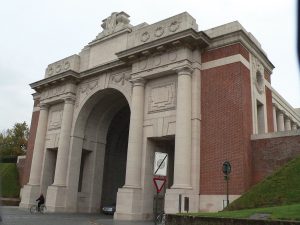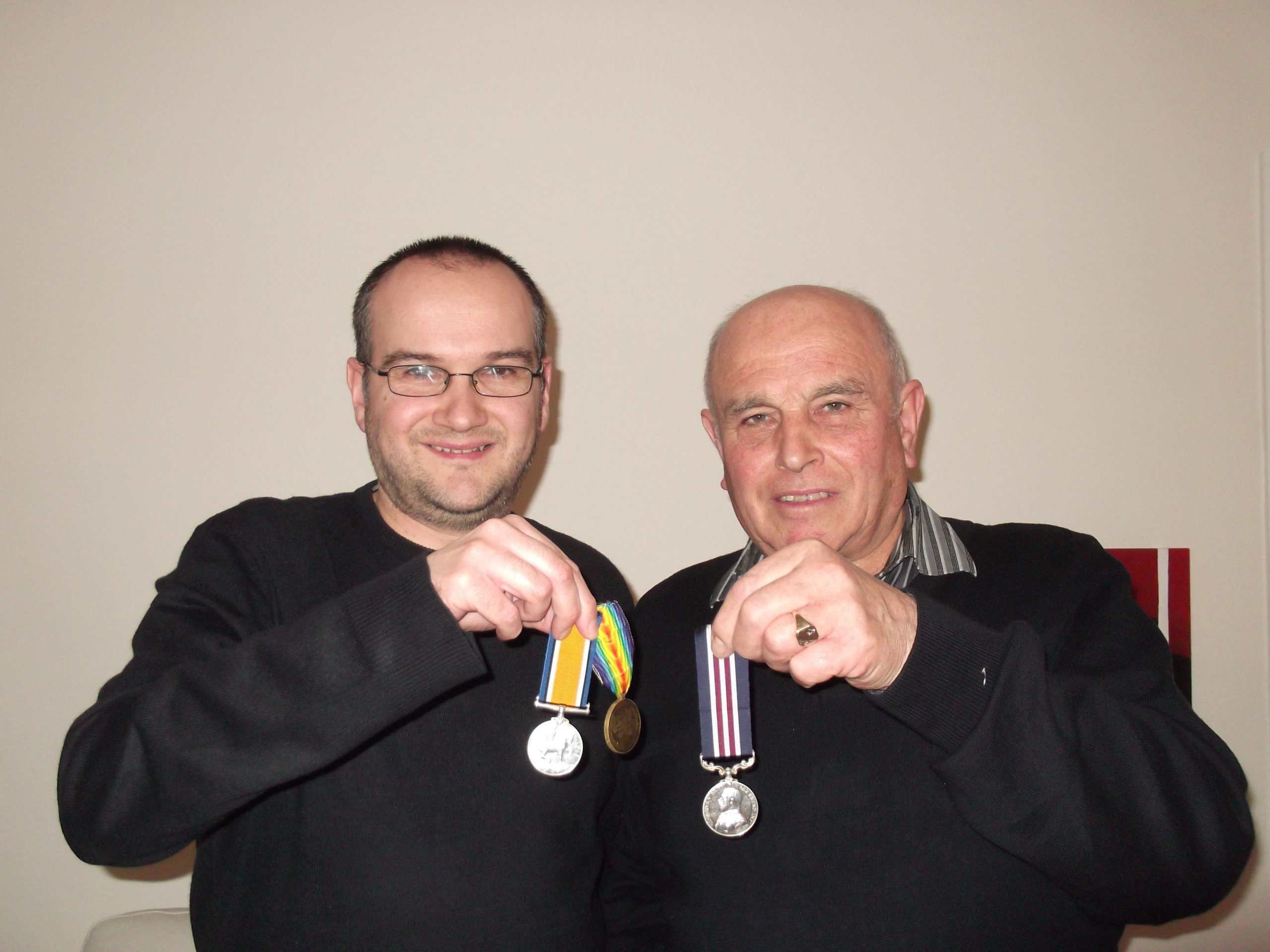My great great uncle, Ernest Edward Ford, a Rifleman in the Kings Royal Rifle Corps, was killed at Passchendaele on 31st July 1917. For his efforts in the war, he was awarded the Military Medal for bravery in the field. In December 2011, I tracked down his campaign medals and the military medal. This brought to an end to the 60 year search involving both my father and I. Here is the full story.
The 60 year search started in the early 1950’s. My father, Douglas Ford was taken to Bawdsey Parish Church near Woodbridge in Suffolk, by his father, my grandfather. Whilst at the church he was shown a plaque on the wall commemorating those from the village who were killed in the First World War. One of those names was Ernest Edward Ford. My grandfather told my father that Ernest was his great uncle. My father was fascinated by this and wanted to find out more, so he talked to his Uncle, his father’s brother who had some information on the family history. He explained to my father that Ernest Edward had been awarded the Military Medal, however he did not know the whereabouts of the medals. He said to my father “perhaps you will find out one day what happened to the medals”.
My father was also interested to know whether Ernest Edward had a grave, and where it was. However, nobody in the family seemed to know. My father’s uncle did, however, state that he believed Ernest Edward had moved to Goole, and it was there where he had enlisted.
In the mid 1950’s, dad started training as a carpenter and joiner, and finished his apprenticeship in 1960. He began to travel in the UK and overseas in the construction industry. He had never lost his curiosity about the medals, and everywhere he travelled with work, he would put notices in shop windows, enquiring on the off chance that somebody might read them, who knew of their whereabouts. He also never walked past an antiques shop without going in to see if they had any medals, and would always inspect any medals they had in stock to see if they were Ernest Edward’s.
In the late 60’s, Dad moved to Wakefield in West Yorkshire and settled there. He continued to search for the medals over the coming years. He also wrote to the war office however they did not seem very forthcoming in those days with giving information out.
The search continued, and in the 1980’s, dad was told that, if he knew Ernest Edward’s service number, he might be able to obtain more information from the war office on the whereabouts of the grave and the medals. He also found out that Military Medal recipients were mentioned in the London Gazette. By this time, I had joined my dad in the research of his family history. We went to the reference library in Leeds, where we were shown a collection of London Gazettes that had been catalogued into books. The series from 1914 to 1918 filled a shelf. We were told that, somewhere in those books, Ernest Edward would be cited, along with his service number, however there was no way of knowing which book it would be in. We set about the daunting task of going through each book in turn. Dad started at one end of the shelf, and I started at the other, to see if we could find the information. Luckily, I found the citation in the second book I picked up. This was our first real breakthrough, as we now had Ernest Edward’s service number.
Dad then wrote to the Commonwealth War Graves Commission, they confirmed that Ernest Edward had enlisted in Goole, and they told us that Ernest Edward was commemorated on the Menin Gate at Ypres. At last we knew where his memorial was and that he didn’t have a known grave. However we still didn’t know what had become of the medals, and even with the additional information, the War Office would not shed any more light on it, saying only that the medals would have been released to the next of kin. But there was no sign of the medals in the family.

Now that we knew the whereabouts of the grave, we decided to visit Ypres, and hoped that we might find out some more about the medals. Our first visit to Ypres was for Armistice Day 2001. We visited the Menin Gate, and also spoke to lots of people to see if we could get any more tips on how we might continue the search for the medals, however we didn’t really get any further.
In around 2005, there was another breakthrough. One of dad’s cousins gave him a death plaque that had been issued to Ernest Edward’s mother . She had been in possession of it for some time and decided to give it to dad when she found out about his search for the medals. Dad decided to write to the war office again, stating that he was now in possession of the death plaque. He asked again if there was a record of who had received the medals after the war. The war office wrote back and said they would have been issued with the death plaque to the same person. We wondered if the medals had been in the family but maybe sold on.
At around the same time, we became aware that Leger Holidays ran trips to the Ypres Salient and heard of very good things about their battlefield tour guides. In 2006 we decided to return to Ypres, this time on a Leger Battlefield tour. It was then that we met Paul Reed and Keith Quibbell, who gave us lots of good advice on how we might move our search along, and also did some research on our behalf.
We continued searching for the medals over the next few years, but still could not find any trace.
In 2011, we visited Ypres again on a Leger tour, and one of the things that we learnt from that trip was how many war records were now being catalogued on the internet. On our return, I visited Ancestry.co.uk where I found some limited records for Ernest Edward. These records did not give us any more information though.
However, only a few weeks later, in December 2011, we had another big breakthrough. Another wave of war records had been loaded onto the internet site, including Ernest Edward’s. From those, we found lots more information, and, crucially, there was a document that stated that the beneficiary of Ernest Edward’s will was a Mrs Jackson in Goole. Not only that, but also there was a copy of a receipt, that confirmed these medals had been sent to Mrs Jackson, and not to the Ford family as the War Office had indicated. At last we knew where the medals had gone. My father and I discussed our next move, and decided that, in the New Year we would visit Goole, to see if we could track the Jackson family down, and to see if they had the medals.
Before that happened though, the last breakthrough came, and this one was the most astonishing. Over that preceding two years, I had periodically been doing internet searches on Ernest Edward Ford and Military Medals, to see if anything came up. Nothing ever had. However, just before Christmas I repeated the search, and there in front of me, on the computer screen, was a copy of an auction catalogue from Warwick and Warwick auction house. Within that catalogue was one lot, for E E Ford – Military Medal, Victory Medal and British War Medal. I had finally found the medals. There was one snag though, the auction had taken place that day, it seemed the medals had most probably been sold, and maybe lost forever. I spoke to dad about it, and undeterred, dad then phoned the auction house the next day. The auction house told us that the medals had been in a private collection for some 50 years; however the collection had recently been opened up, to be auctioned. They also told us that Ernest Edward’s medals had been sold to a dealer, Dixons medals in Bridlington. Dad then phoned Dixons, and spoke to the proprietor, Chris Dixon. On finding out that the medals had been awarded to our ancestor, and hearing the story of our search, Chris immediately agreed to sell them to us, for a discounted price, and without offering them to the open market. We were so relieved and so grateful at how sympathetic Chris had been towards us. On December 21st 2011, dad and I travelled to Bridlington, where we picked up the medals from Chris Dixon. Finally, the search had come to an end, and for the first time ever, the medals were in the possession of the family.
We could not believe that we had the medals, but what astonished us more, was some of the coincidences in the story. Firstly, Ernest Edward had grown up in East Anglia, and moved to Yorkshire before the war where he settled. Dad commented on how he had also grown up in East Anglia and settled in Yorkshire. Secondly, the medals had also made their way to Yorkshire after the auction. They seemed destined to come to us.
If there’s one message that we would like to give to other people who might be in the same position of not knowing where their ancestor’s medals are – that message would be to never give up. After nearly 60 years of a search which seemed like a search for a needle in a haystack, we have the medals back where we feel they belong.
If you are interested in any of the battlefield tours we offer, please visit our website Leger Battlefield Tours.


Well done Johnathan
I know Doug from the Wakefield Labour Club and he is so proud of your efforts in locating the medals.
Finding details of how the Military Medal was won could be a difficult task but your tenacity paid off in locating the medal, so you never know !
Good luck with your quest.
What an amazing story! 60 years of searching and hitting so many brick walls would be enough to put anyone off but your determination sure paid off.
What an amazing story, well done for your tenacity. Did you discover who Mrs Jackson was and the relationship was between them. Your story has given me fresh impetus to carry on my own family research.